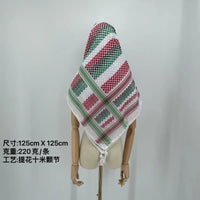The keffiyeh, a traditional Middle Eastern headdress, has been a symbol of cultural identity and political expression for many years. However, its use in Turkey has been a subject of controversy, raising the question: Is the keffiyeh banned in Turkey? This article delves into the historical and socio-political context of the keffiyeh in Turkey, exploring whether it is banned and the implications of its use.
Historical Context of the Keffiyeh in Turkey
The keffiyeh, also known as a "pusi" in Turkish, is commonly associated with Palestinian and Kurdish identities. Traditionally, it serves practical purposes, such as protection from the sun and dust. However, its political connotations have made it a contentious symbol in Turkey.
The Keffiyeh and the Kurdish Identity
In Turkey, the keffiyeh has often been linked to the Kurdish minority and their struggle for recognition and rights. The Kurdish Workers' Party (PKK), considered a terrorist organization by the Turkish government, has adopted the keffiyeh as part of its identity. This association has led to heightened scrutiny and suspicion of those wearing the keffiyeh in Turkey.

Legal Status of the Keffiyeh in Turkey
While there is no explicit nationwide ban on the keffiyeh in Turkey, its use can result in legal and social repercussions, particularly in certain contexts.
Case Study: Cihan Kırmızıgül
One notable instance highlighting the contentious nature of the keffiyeh in Turkey is the case of Cihan Kırmızıgül. In 2010, Kırmızıgül, a university student, was arrested in Istanbul for wearing a keffiyeh. He was accused of being involved in a PKK attack, solely based on his attire. Despite the lack of concrete evidence, Kırmızıgül was sentenced to 11 years in prison, underscoring the deep-seated suspicion surrounding the keffiyeh.
Regional Variations and Enforcement
The enforcement of restrictions on wearing the keffiyeh can vary significantly across Turkey. In more cosmopolitan areas like Istanbul, wearing a keffiyeh might attract less attention compared to regions with a significant Kurdish population, where it could be perceived as a political statement.

Socio-Political Implications
The controversy surrounding the keffiyeh in Turkey reflects broader tensions between secularism, nationalism, and ethnic identities.
Secularism and Nationalism
Turkey's founding principles of secularism, established by Mustafa Kemal Atatürk, have historically led to restrictions on overt religious and ethnic symbols in public spaces. This secular framework has often clashed with the cultural expressions of minority groups, including the Kurds.
Ethnic Identity and Cultural Expression
For many Kurds in Turkey, the keffiyeh is more than just a piece of clothing; it is a symbol of their cultural heritage and resistance. The legal and social challenges they face for wearing the keffiyeh highlight the ongoing struggle for ethnic recognition and rights in Turkey.

Conclusion
So, is the keffiyeh banned in Turkey? While there is no explicit legal ban, wearing a keffiyeh can lead to significant legal and social consequences, particularly for those associated with the Kurdish identity. The keffiyeh's contentious status underscores the broader socio-political dynamics in Turkey, where secularism, nationalism, and ethnic identities intersect.
As Turkey continues to navigate these complex issues, the keffiyeh remains a potent symbol of cultural identity and political expression. For those interested in the intersection of fashion, politics, and cultural identity, the keffiyeh in Turkey offers a compelling case study.





